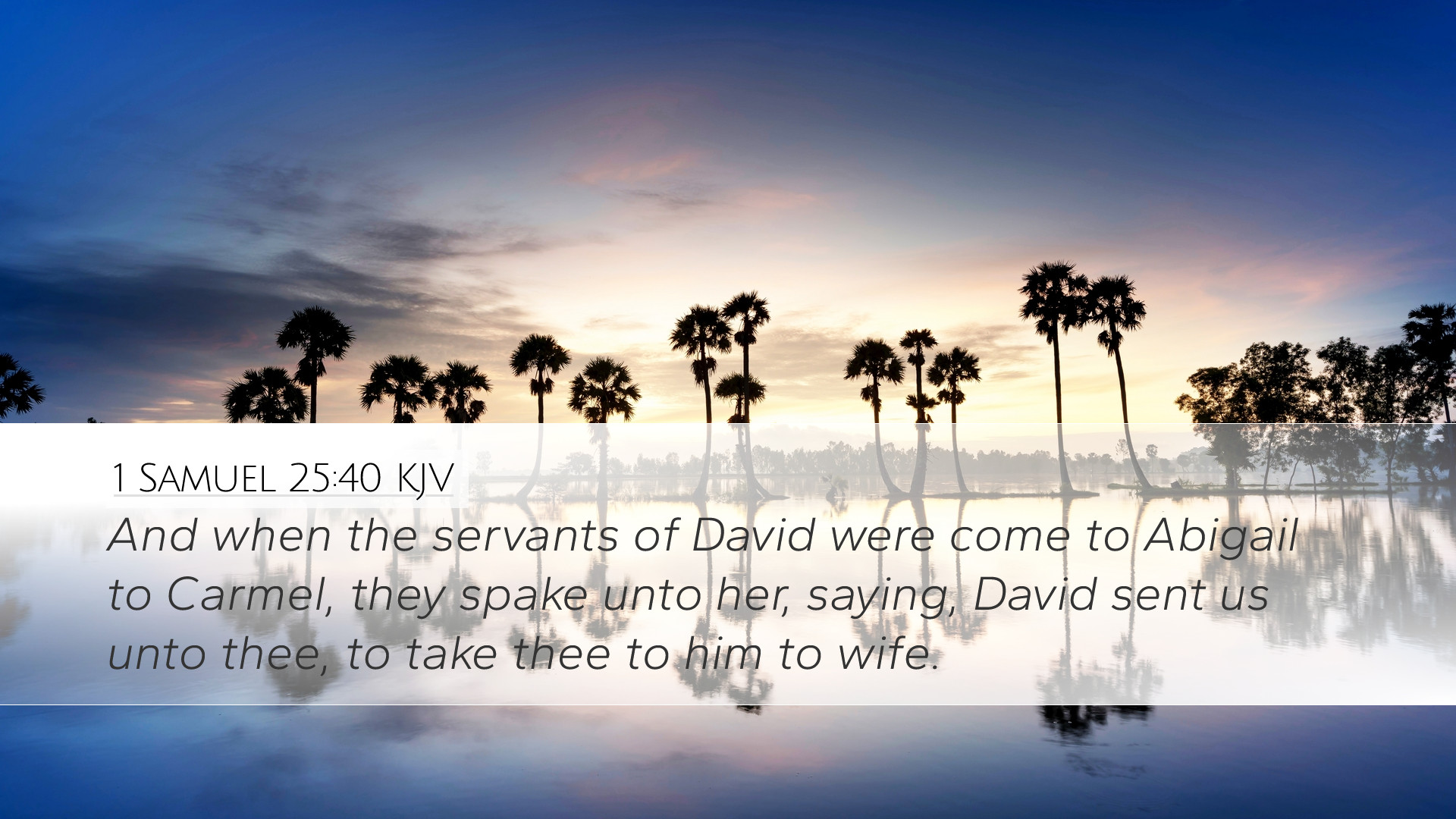Commentary on 1 Samuel 25:40
Verse: "And when the servants of David were come to Abigail to Carmel, they spake unto her, saying, David sent us unto thee, to take thee to him to wife."
Contextual Background
1 Samuel 25 relates a significant event in the life of David, a man described as a man after God’s own heart (1 Samuel 13:14). This chapter takes place during the time when David was fleeing from King Saul, and he had amassed a band of followers. Abigail, the wife of Nabal, plays a crucial role in this narrative, exhibiting wisdom and discernment during a critical confrontation.
Summary of the Narrative
Prior to this verse, we witness the folly of Nabal, whose name means "fool." He refused David's request for provisions, leading to David preparing to avenge the insult. Abigail, recognizing her husband's folly, intervenes and brings gifts to appease David, effectively saving her household. After Nabal's death, David sends his servants to propose marriage to Abigail, recognizing her wisdom and the gracious manner in which she handled the situation.
Theological Insights
- Divine Providence: Abigail's intelligent intervention highlights God’s providential care. This event demonstrates that God uses people, even in difficult relationships, to accomplish His purposes. The narrative indicates that Abigail was destined for greater things, moving from a life with a foolish husband to becoming a wife of the anointed king.
- Character of Abigail: Abigail embodies wisdom and courage. Her swift actions in interceding for her household illustrate a woman of great understanding, emphasizing the importance of prudent conduct and timely intervention. This serves as a model for how to respond to conflicts and the importance of taking initiative in crises.
- Redemptive Relationships: David's proposal to Abigail illustrates the theme of redemptive relationships. After Nabal’s death, David saw Abigail not only as a wife but as a partner in his mission. This relationship exemplifies the beauty of God’s restoration, often bringing individuals into divine relationships that fulfill their intended purposes.
Commentary Excerpts
Matthew Henry
Matthew Henry in his commentary remarks that David’s selection of Abigail was based on her discernment and capability to manage emergencies effectively. Her virtues shine through her actions and words, making her worthy of being united with David. He emphasizes the role of prayer and providence in leading David to Abigail, implying that God orchestrated their union for His purposes.
Albert Barnes
Albert Barnes elaborates that this event demonstrates the change in David's circumstances. Previously a fugitive, David begins to ascend towards kingship. Barnes notes that Abigail's character was instrumental in this transition as her wisdom became a decisive factor in the outcome. He also highlights that the manner of David’s courtship reflects the social customs of the time, indicating an approach that is respectful and dignified.
Adam Clarke
Adam Clarke critically examines the nature of Abigail’s character and her decision-making process in the face of adversity. He notes that her actions reveal a submissive yet intelligent woman who is proactive in her faith and relationships. Clarke points out that the choice to marry David placed her in a new role that carried significant responsibilities, aligning with God’s plan for Israel's future.
Practical Applications
- Leadership and Wisdom: For pastors and leaders, Abigail serves as an archetype of how to exercise wisdom and tact in leadership roles. Her ability to pacify David, a fierce warrior, illustrates the effectiveness of peaceful negotiation and thoughtful responses in leadership.
- God’s Sovereignty: Abigail's story reassures believers that God uses all circumstances for His purpose. It encourages a deeper trust in God's plans, often revealing greater blessings after trials.
- Understanding Relationships: For theologians and scholars, understanding the dynamics of Abigail and David's relationship paves the way for discussions on marriage, partnerships, and God's design for covenantal relationships.
Conclusion
1 Samuel 25:40 serves as a pivotal fingerpost in the narrative of David's life, marking a transition from the trials of leadership under oppression to embracing a partnership that would influence Israel’s future. The role of Abigail, both as a wise woman and potential queen, embodies God's providential design in human relationships. Understanding this verse enriches the narrative of divine purpose in scriptures and offers profound insights for pastoral care, theological reflection, and personal application.


